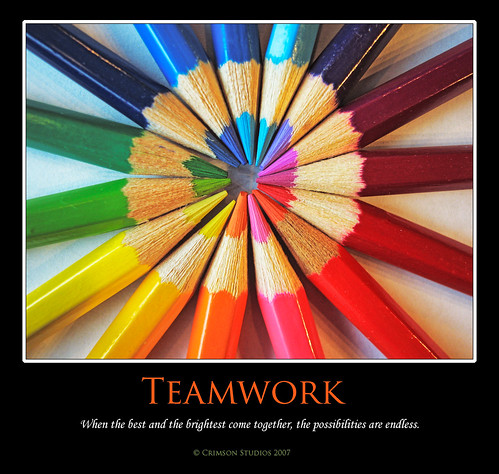Motivational Posters
April 2, 2010
I still remember that during the attended course, we are also encouraged to ponder upon various motivational posters. They are easy to get even at the daily mart at any petrol stations.
The following posters are among the popular that can be founded.






Tags:
friendship, motivation, poster, posters, success, teamwork
Posted at: 02:40 PM | 0 Comments | Add Comment | Permalink
Mind Mapping
March 19, 2010
When mentioning about Mind Mapping, the name Tony Buzan is always giving a synonym. According to him, Mind Mapping is a powerful tool especially in training. Mind mapping works through different angle in supporting learning experience.
Mind mapping is proved to support the following scopes:
Radiant Thinking
Memory
Creativity
Learning
Teaching
Planning and Organising
Presenting
Group Collaboration
Problem Solving
Science
Historically, as published on Wikipedia:
Mind maps (or similar concepts) have been used for centuries in learning, brainstorming, memory, visual thinking, and problem solving by educators, engineers, psychologists, and others. Some of the earliest examples of mind maps were developed by Porphyry of Tyros, a noted thinker of the 3rd century, as he graphically visualized the concept categories of Aristotle. Philosopher Ramon Llull (1235 - 1315) also used mind maps.
The semantic network was developed in the late 1950s as a theory to understand human learning and developed into mind maps by Allan M. Collins and M. Ross Quillian during the early 1960s. Due to his commitment and published research, and his work with learning, creativity, and graphical thinking, Collins can be considered the father of the modern mind map.[citation needed]
British popular psychology...
[More]
Tags:
creativity, learning, memory, mind map, teaching, thinking
Posted at: 11:39 AM | 0 Comments | Add Comment | Permalink
What Makes a Person Not Learning?
June 4, 2008
Learning will become inproficient when:
LEARNING Learning process occurs when a new technology or knowledge being transferred and there is a change of behaviour.
However,
There are several factors that people always to take for granted which had led to learning process to be NOT successful as it should.
Factors Contributing To Learning as Not Successful i) Misunderstood words
Signs that show a student have come across a misunderstood word:
· Blank (face)


· Tired

· Upset

· Not interested

· Take a long time reading


· Yawning

· Daydreaming
· Doodling

Solution: Prepare a dictionary or related references during learning session.
Whenever a student shows any of the above mentioned signs, ask him if there is any misunderstood word he is having. Any misunderstood word can be translated by using the provided dictionary.
ii) Lack of mass
Signs that show a student have come across a...
[More]
Tags:
confused, lack of mass, learning process, learning proficiency, misunderstood
Posted at: 12:06 PM | 0 Comments | Add Comment | Permalink
Training, Coaching, Counselling and Mentoring
January 21, 2008
(aziyati yusoff) - 21 Jan 2008
In training world, one could not avoid of coming across different approaches of delivery and presentation's styles. Terminologies such as trainer, coach, counselor and mentor are different in roles but can play its own significant part to training metholodology.
Mariane L'Ecuyer through web page with url of http://www.crmadvocate.com/required/elix3.pdf , she said "Training imparts concrete knowledge about concrete matters such as products, corporate objectives, tools (hardware and software), and processes. While coaching is more geared towards monitoring and improving how the knowledge learned in training is used."
Most of training institutions consider all the feasible method of training including counselling and mentoring to deliver their business.
Vanessa Emile through her website of http://www.vanessaemile.co.uk/pages/coach.html has outlined the comparison of coaching vs counselling in 16 aspects. The aspects that she focussed are primary life focus, subject focus, model, nature of issue, treatment of past, questions asked, client goals, accountability of goals, relationship, function, training or educational background, style, rate of change, responsibility for outcomes, disclosure, and payment.
Basically she defined coaching as Focuses on a person’s present, in order to help them create actionable strategies for achieving specific goals in one’s personal and work...
[More]
Tags:
coaching, counselling, mentoring, training
Posted at: 04:24 PM | 0 Comments | Add Comment | Permalink
The Art of Listening
November 20, 2007
prepared by: Aziyati Yusoff
It is true that most of the blog contents on this web page are adaptations from various resources. The main aim of the journal itself is to share related materials to Training Methodology (as the subject matter).
Like this article of "The Art of Listening", we can find a lot of scholars putting their effective views and show their significance to the importance of this subject.
I would like to take one of the examples written by Brenda Ueland from the www homepage of Dr. Traubman. She said that: "It is through this creative process (the art of listening) that we at once love and are loved". She added with the following main points:
When people listen, creative water flows - It is when people really listen to us, with quiet, fascinated attention, that the little fountain begins to work again, to accelerate in the most surprising way.
Women listen better - I think women have this listening faculty more than men. It is not the fault of men. They lose it because of their long habit of striving in business, of self-assertion. And the more forceful men are, the less they can listen...
[More]
Tags:
listening skill, the art of listening
Posted at: 11:46 AM | 0 Comments | Add Comment | Permalink
11 Rules of Writing
November 9, 2007
prepared by:
Aziyati Yusoff (9 Nov 2007)
Writing can be everyone's passion. Knowledge of writing is also a necessity when we are writing for a purpose. I have found a page discussing 11 rules of presenting a Good Writing. It is taken from this particular webpage:
11 Rules of Writing
1. To join two independent clauses, use a comma followed by a conjunction, a semicolon alone, or a semicolon followed by a sentence modifier.
2. Use commas to bracket nonrestrictive phrases, which are not essential to the sentence's meaning.
3. Do not use commas to bracket phrases that are essential to a sentence's meaning.
4. When beginning a sentence with an introductory phrase or an introductory (dependent) clause, include a comma.
5. To indicate possession, end a singular noun with an apostrophe followed by an "s". Otherwise, the noun's form seems plural.
6. Use proper punctuation to integrate a quotation into a sentence. If the introductory material is an independent clause, add the quotation after a colon. If the introductory material ends in "thinks," "saying," or some other verb indicating expression, use a comma.
7. Make the subject and verb agree with each other, not with a word that comes between...
[More]
Tags:
rules of writing
Posted at: 01:21 PM | 0 Comments | Add Comment | Permalink
The 5 Senses
November 1, 2007
sent by Amarie C. Zaldivar, 1 Nov 2007
|
Tags:
heart, senses, touch, wish
Posted at: 09:12 AM | 0 Comments | Add Comment | Permalink
The Surgeon Story
November 1, 2007
(sent by: Amarie C. Zaldivar), 1 Nov 2007
One morning at a doctors surgery a patient arrives complaining of serious back-pain. The doctor examines him and asks him" OK, what happened to your back?"
The patient replies "You know that I work for a local night club? This morning I got home to my apartment early and heard a noise in my bedroom. On entering I knew someone had been with my wife and the balcony door was open. I rushed out the balcony door and did not find anyone. As I looked down from the balcony I saw a man running out and he was dressing himself. I grabbed the fridge and threw it at him,That's how I strained my back"
The 2nd patient arrives looking as if he has been in a car wreck. The doctor said "My previous patient looked bad, but you look terrible.What the hell happened to you?"
He replied, "You know I have been unemployed for a while now ..Today was the first day at my new job. I forgot to set my alarm and was running late. I was running out of the building, getting dressed at the same time, and you won't...
[More]
Tags:
the surgeon
Posted at: 09:10 AM | 1 Comment | Add Comment | Permalink
The Johari Window
October 26, 2007
prepared by: Aziyati Yusoff (26 Oct 2007)
Part of Communication Skills is to understand individuals characteristics. One of the best topic to discuss of individual's impression includes The Johari Window. I've found the following article relates very much to the topic from http://www.mindtools.com/CommSkll/JohariWindow.htm
The Johari Window
Creating Better Understanding
Between Individuals and GroupsThe Johari Window is a communication model that can be used to improve understanding between individuals within a team or in a group setting. Based on disclosure, self-disclosure and feedback, the Johari Window can also be used to improve a group's relationship with other groups.
Developed by Joseph Luft and Harry Ingham (the word “Johari” comes from Joseph Luft and Harry Ingham), there are two key ideas behind the tool:
That individuals can build trust between themselves by disclosing information about themselves; and
That they can learn about themselves and come to terms with personal issues with the help of feedback from othersBy explaining the idea of the Johari Window to your team, you can help team members understand the value of self-disclosure, and gently encourage people to give and accept feedback. Done sensitively, this can help people build more-trusting relationships with...
[More]
Tags:
johari window
Posted at: 11:03 AM | 1 Comment | Add Comment | Permalink
A Mouse Trap Story
September 28, 2007
(Thanks to Amarie. I just copied this story from the mail attachment sent to me.)
![[]](/pics/mouse1.bmp)





 A mouse looked through the crack in the wall to see the farmer and his wife open a package.
A mouse looked through the crack in the wall to see the farmer and his wife open a package.
What food might this contain? The mouse wondered - he was devastated to discover it was a mousetrap. ![[]](/pics/mouse2.bmp)
Retreating to the farmyard, the mouse proclaimed the warning: ![[]](/pics/mouse3.bmp)

There is a mousetrap in the house! There is a mousetrap in the house!
The chicken clucked and scratched, raised her head and said, "Mr.Mouse, I can tell this is a grave concern to you, but it is of no consequence to me."![[]](/pics/chick.bmp) " I cannot be bothered by it."
" I cannot be bothered by it." 
The mouse turned to the pig and told him, "There is a mousetrap in the house! There is a mousetrap in the house!"
The pig sympathized, but said, I am so very sorry, Mr. Mouse, but there is nothing I can do about it but pray. 
"Be assured you are in my prayers."![[]](/pics/pig.bmp)
The mouse turned to the cow and said "There is a mousetrap in the house! There is a mousetrap in the house!"

The cow...
[More]
Tags:
mouse trap story
Posted at: 09:50 AM | 0 Comments | Add Comment | Permalink